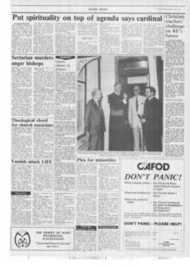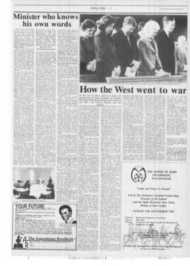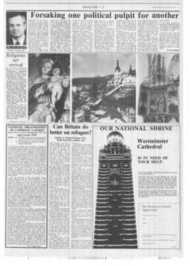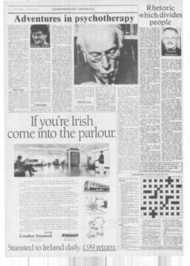Page 5, 26th July 1991
Page 5

Report an error
Noticed an error on this page?If you've noticed an error in this article please click here to report it.
Tags
Share
Related articles
Catholic Schools 'threatened' By Baker By Peter Stanford...
Heads See Conflict In Schools' Vision
The Authorities Are Downplaying The Headteacher...
Inside
Patten In Education Row
Minister who knows his own words
Kenneth Clarke, Secretary of State for Education, sees the church-state partnership as 'intact and healthy' despite criticisms from diocesan officials and headteachers of his reforms. He tells Peter
Stanford why.
I FELT more than usually nervous waiting to meet Kenneth Clarke. It wasn't only the fact that the rather anonymous 1970s building that houses his ministry was seemingly in danger of _imminent collapse, shaken to its foundations by the incessant drilling coming from the nextdoor, semi-completed Channel Tunnel railway terminal at Waterloo Station.
Neither was it the portrait ,gallery of former secretaries of state for education who beamed out importantly from the .waiting room wall — those who -went on to greater fame, most -notably Margaret Thatcher, :Who headed the ministry in the -early 1970s, given equal billing with the swiftly forgotten Fred Wiley and Reg Prentice, her -two successors, the latter I dimly .recall later leaving Labour to join the Tories and sinking into oblivion.
It was more Mr Clarke's reputation for abruptness that worried me. After all the premise for the interview was a Catholic Herald survey of Catholic secondary heads that showed over 70 per cent as regarding the government's vision of the purpose of schools to be at odds with the church's. And the minister is — if his robust rebuttal of the stronglyworded criticisms of British Medical Association over NHS reforms during his turbulent period as Secretary of State for Health prior to his move to education was anything to go by — not a man to meekly bow to the opinions of a professional body and change his mind.
But reputations can be misleading. As I was swept into Mr Clarke's large if noisy office (the distant drone of drilling was mixing now with the afternoon stampede of commuter specials rumbling over the points out of Waterloo), he was all smiles and apologies for the delay, explaining that our meeting would have to be brief because there was a group waiting to meet him at the House of Commons, a good 20 minutes .away in the rush-hour traffic.
His packet of cigars m hand, along with a bevy of advisers, he .put up, to employ an overplayed political metaphor but one appropriate since he lists the sport its his hobby in Who's Who, the sort of sterling, no-nonsense defence on what many regard as a decidedly sticky wicket that is fast becoming the hallmark of . England's cricketers.
As time was short, I decided to start with those dissident headtcachers. "Well, I would ask individual heads what specifically it was they objected to," Mr Clarke retorted. "The reforms are a combination of the national curriculum, the testing system associated with that curriculum and changes to the management of schools based on local management where people ballot in favour of going on to grant-maintained status." (Never once — and there were chances aplenty in our interview — did he slip into the opposition-speak of opting out, and such was his resilience that I even found myself using his chosen phraseology). "And none of those reforms seem to be incompatible with the Catholic view of schools".
Well what about opting out, which Christopher Storr, Southwark diocese's director of education recently labelled "morally questionable" and over which the bishops of England and Wales are clearly very unhappy? "I hesitate to challenge the bishops on their theology but I don't really think there are any theological arguments either in favour or against moving from local authority management to grantmaintained status. I do not see why Catholic parents should be uniquely barred from having the opportunity of voting for grant maintained status. Nor do I see anything Christian in giving the headteacher and the governors control over all the resources of a school as opposed to giving part of them to the local education authority:" Warming to this theme, Mr Clarke went on to quote one of the handful of Catholic schools that have so far opted out. "Where we have grant maintained status, its been a great boost and I don't think you'll find a grant-maintained school anywhere. including the Catholic one in Liverpool, that would dream of going back to local authority management".
St Francis Xavier — SFX to generations of Liverpool schoolboys — opted out (I use the term not through any bias but simply for the sake of variety when faced with Mr Clarke's repetition of his chosen term) against the wishes of Archbishop Derek Worlock of Liverpool — just as the Cardinal Vaughan School in west London rejected Cardinal Hume's wishes in order to follow its star with the Secretary of State while the most recent addition to the list, the John Fisher School in Purley, Surrey, is in the diocese where the aforementioned Mr Storr has made his views so clear.
The church's argument in each of these cases has been that the best interests of the local Catholic community are not best served by one school looking to it own individual needs. It cut little ice with the Secretary of State.
"Schools that go for grant maintained status have no adverse or any other effect on the schools in the area. It's a very odd definition of Community that depends on the right of NALGO officials in county hall to be responsible for the repair of buildings."
Hitherto in answering my questions Mr Clarke had projected something of the air of a seasoned and slightly bored secondary school English teacher, telling his pupils for the umpteenth time that Lady Chatterley's Lover is not a "dirty book". (D H Lawrence, like Mr Clarke, a Nottinghamshire man, is a favourite of the minister). But the mention of the National Association of Local Government Officers brought a glint to his eyes.
Since I felt pursuing this line of attack on the trade unions was not quite in the remit of our brief meeting, 1 changed tack. Was the "Dual System", the partnership of church and state in education, set up by Butler's 1944 Education Act, under threat?
Not at all, Mr Clarke came back. There was a little local difficulty but nothing to get excited about. "1 think the basic settlement of 1944 is healthy and intact and I will listen to the churches except when they're saying that it is un-Christian to deprive NALGO officials of a say in running Catholic schools in that diocese".
There was that accronym again. I admitted to a momentary blind spot about the occasions when the Catholic church had backed NALGO. "That's just me being mischievous", Mr Clarke reassured me.
Vs'e went on to central funding of sixth form colleges — the Secretary of State was emphatic that there was no room for discussion on giving the church a seat on the national funding council that will oversee the financing of such tertiary institutions despite the fact that a sizeable number of them are run by local dioceses. And the vexed question of transport where Hertfordshire Count. Council have decided to charge Catholic parents for their children's travel to church schools.
"I certainly disapprove of the decision taken by Hertfordshire. I've always argued that it goes with the right of Catholic parents to choose Catholic schools that they should expect a contribution to transport. But school transport is a local government matter, and when things are a local government matter, I don't think that means they are unless the Secretary of State disagrees".
Inevitably, however, we ended up back at grant maintained status (by this stage we were as one in what to call it). Should all Catholic schools apply en masse, 1 suggested.
"1 personally expect most of the secondary schools in this country to choose to become grant maintained " — remember you read it here first — " and I expect the appeal of grant-maintained status to be as strong for voluntary-aided schools as it is to others". But it had to be a question for each school, Mr Clarke maintained, otherwise you'd be taking away their new found freedoms. "I don't think either the cardinal or myself should have a total veto on the aspirations of individual schools".
Cardinal Hume might find the equation of his powers over schools with those of Mr Clarke a rather disingenuous one, I reflected as I was swept out of the Secretary of State's office and back into the real world of drills and rush-hour.
blog comments powered by Disqus











